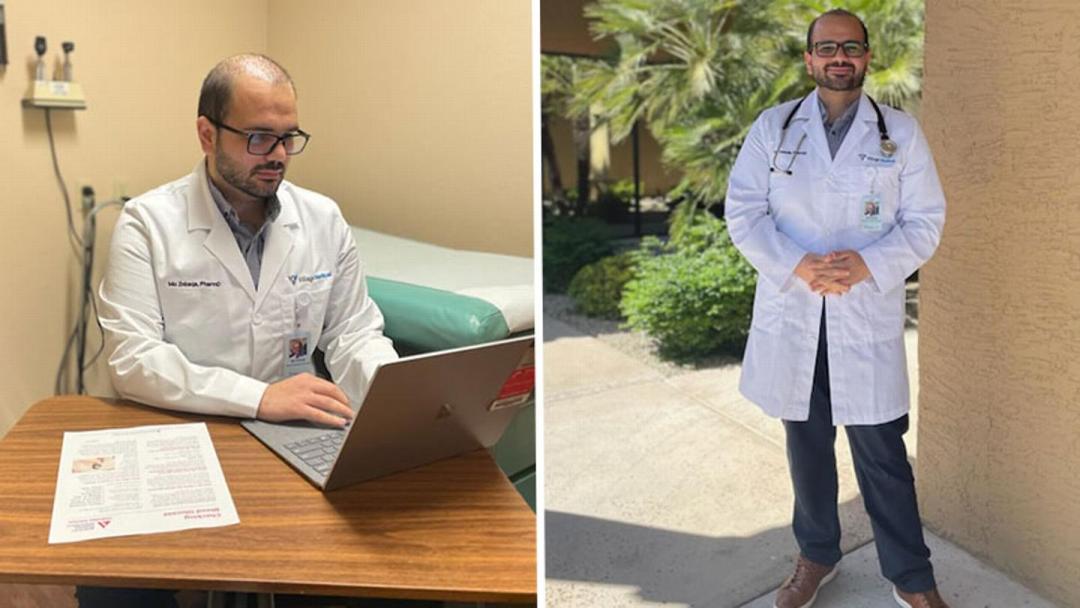… help provide vaccines for children in countries including Afghanistan, Central African Republic, Chad, Democratic Republic of the Congo, East … the United Nations’ Sustainable Development Goals – which will be central to how we recover from the current health crisis stronger.” The … United Nations Foundation The UN Foundation brings together ideas, people, and resources to help the United Nations drive global progress …
Pharmacy & Healthcare
A perfect pairing for patient care
Walgreens ambulatory care pharmacist Mohanad Znbaqa and Village Medical primary care providers work together to create a unique healthcare solution for patients in Phoenix.
Elyse Russo, Walgreens Stories

When a young Village Medical patient was experiencing very high blood sugar levels and needed help, Walgreens ambulatory care pharmacist Mohanad "Mo" Znbaqa was there.
Through Znbaqa’s consistent support and education about medication and lifestyle changes to optimize blood sugar control, the patient’s blood sugar returned to normal levels in three months’ time.
“Having an ambulatory care pharmacist here in the practice weekly has been extremely helpful to me, as a provider, and more importantly to the patients we care for as a team,” says Village Medical nurse practitioner Shana J. Bean about Znbaqa. “He is allowed that additional time that us providers may not have with patients to elaborate and continue crucial conversations with patients to help improve their health and overall quality of life.”
So, what is an ambulatory care pharmacist? It’s a type of clinical pharmacist that completes a post-graduate pharmacy residency after pharmacy school, which provides the experience and training of managing patients in collaboration with primary care providers. In this role, Znbaqa has been a key player in a unique pilot program developed by Walgreens and Village Medical in response to the local healthcare needs of the Phoenix metro area.
In this pilot program, Znbaqa signed collaborative practice agreements with approximately 20 Village Medical primary care providers. These agreements give him the ability to prescribe under the providers’ oversight and management. When Znbaqa receives a patient referral from one of these providers, he can adjust the patient’s medication regimen and initiate new medications when appropriate. He specifically works with patients who have chronic diseases such as diabetes, hypertension, heart disease and pulmonary disease.
“I can meet with patients more frequently than primary care providers, allowing me more time to educate patients about chronic conditions, improve their medication management and support them with lifestyle changes,” Znbaqa says.
Znbaqa stressed how “team-based care,” a term for pharmacists and primary care providers working together, can improve outcomes for the patients. He says his goal is to help patients avoid preventable hospitalizations so they can spend more time at home leading healthy lives.
During his residency, Znbaqa cared for patients struggling with chronic illness in both family medicine clinics and local hospital wards, which he says sparked his passion to play a critical role in chronic disease management and preventive care.
“I saw a lot of patients in the hospital who could have been prevented from going to the hospital,” Znbaqa says. “So that became my motivation.”
Znbaqa’s commitment to improving his patients’ lives through support, education and medication management is truly bettering the healthcare landscape in the Phoenix metro area.
Znbaqa is fulfilled by the work, too: “To impact people’s lives in this way, I see it as such a blessing.”
Through Znbaqa’s consistent support and education about medication and lifestyle changes to optimize blood sugar control, the patient’s blood sugar returned to normal levels in three months’ time.
“Having an ambulatory care pharmacist here in the practice weekly has been extremely helpful to me, as a provider, and more importantly to the patients we care for as a team,” says Village Medical nurse practitioner Shana J. Bean about Znbaqa. “He is allowed that additional time that us providers may not have with patients to elaborate and continue crucial conversations with patients to help improve their health and overall quality of life.”
So, what is an ambulatory care pharmacist? It’s a type of clinical pharmacist that completes a post-graduate pharmacy residency after pharmacy school, which provides the experience and training of managing patients in collaboration with primary care providers. In this role, Znbaqa has been a key player in a unique pilot program developed by Walgreens and Village Medical in response to the local healthcare needs of the Phoenix metro area.
In this pilot program, Znbaqa signed collaborative practice agreements with approximately 20 Village Medical primary care providers. These agreements give him the ability to prescribe under the providers’ oversight and management. When Znbaqa receives a patient referral from one of these providers, he can adjust the patient’s medication regimen and initiate new medications when appropriate. He specifically works with patients who have chronic diseases such as diabetes, hypertension, heart disease and pulmonary disease.
“I can meet with patients more frequently than primary care providers, allowing me more time to educate patients about chronic conditions, improve their medication management and support them with lifestyle changes,” Znbaqa says.
Znbaqa stressed how “team-based care,” a term for pharmacists and primary care providers working together, can improve outcomes for the patients. He says his goal is to help patients avoid preventable hospitalizations so they can spend more time at home leading healthy lives.
During his residency, Znbaqa cared for patients struggling with chronic illness in both family medicine clinics and local hospital wards, which he says sparked his passion to play a critical role in chronic disease management and preventive care.
“I saw a lot of patients in the hospital who could have been prevented from going to the hospital,” Znbaqa says. “So that became my motivation.”
Znbaqa’s commitment to improving his patients’ lives through support, education and medication management is truly bettering the healthcare landscape in the Phoenix metro area.
Znbaqa is fulfilled by the work, too: “To impact people’s lives in this way, I see it as such a blessing.”